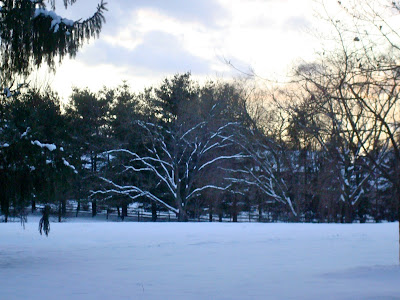Winter's beauty awakens the inner poet in many writers. Shakespeare described leafless trees as "bare ruined choirs, where late the sweet birds sang" (Sonnet 73).
David Guterson's novel, Snow Falling on Cedars, winner of the 1996 American Booksellers Book of the Year, succeeded in getting his reader to feel, hear, and smell the loneliness amplified by a winter scape.
"Beneath the stars, with his overcoat on, he wandered out into the cold. His feet took their own direction through the cedar woods, and underneath the canopy of branches he smelled the old fragrance of the place of his youth and the clean scent of the new fallen snow. Here under the trees it was fresh and untouched. The branches of the cedars were hung with it and beyond them the sky lay immaculate and decemviral, the stars chilled points of light. He followed his feet to... the hollow cedar tree of his youth.
Ismael sat inside for a brief time with his coat wrapped tightly around him. He listened to the world turned silent by the snow; there was absolutely nothing to hear. The silence of the world roared steadily in his ears while he came to recognize that he did not belong here, he had no place in the tree any longer. Some younger people should find this tree, hold to it tightly as their deepest secret...For them it might stave off what he could not help but see with clarity: that the world was silent and cold and bare and that in this lay its terrible beauty" (443).
Using winter's beauty to prove the world is silent, cold, and bare is Guterson's perspective, but I prefer C.S. Lewis' thesis: addiction to self leaves the world "always winter and never Christmas". Read how he describes Edmund's misery as he searches for the White Witch's Turkish Delight:
"The first thing he realized when he got outside and found the snow falling all around him, was that he had left his coat behind in the Beaver's house. And of course there was no chance of going back to get it now. The next thing he realized was that the daylight was almost gone for it had been nearly three o'clock when they sat down to dinner and the winter days were short. He hadn't reckoned on this; but he had to make the best of it. So he turned up his collar and shuffled across the top of the dam... to the far side of the river."
Thankfully, Lewis doesn't leave Edmund cold and miserable, he introduces the Christ-figure, Aslan, who sacrifices himself to redeem Edmund and begin to unthaw the earth's and Edmund's personal tundras.
Scripture explains how Christ's death in our place provides the bridge of forgiveness from the misery of the self-serving life.
The Savior offers a warm home which stands in relief against the cold, bare realities of life without him.
He also promises us hope of eternal Spring.
To feel hope's reality, read the apostle John's description of a new heaven and a new earth in the book of Revelation, chapters twenty-one and twenty-two:
"And I saw a new heaven and a new earth...And I heard a loud voice from the throne, saying, 'Behold the tabernacle of God is among men, and He shall dwell among them, and they shall be His people...and He shall wipe away every tear from their eyes; and there shall no longer be any death; there shall no longer be any mourning, or crying, or pain'...The city has no need of the sun or of the moon to shine upon it, for the glory of God has illumined it, and its lamp is the Lamb...Only those (shall come into the city) whose names are written in the Lamb's book of life. And he showed me a river of the water of life, clear as crystal, coming from the throne of God and of the Lamb...And on either side of the river was the tree of life...yielding its fruit every month" (21:1, 3-4, 23, 27 and 22:1-5).
What a lovely, welcoming picture of our hope of heaven where the Lamb's sacrifice will warm our cold, selfish hearts and place us in a home where it is eternally spring.


















0 comments :
Post a Comment